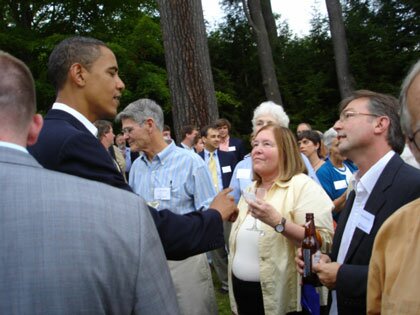The Soft-Ball, and Then the Change-Up: Obama On the Iowa Caucuses, In August
Got a chance to ask Barack Obama two questions, this past August, down in Norwich. I had both prepared well in advance, because even at that point his star was rising fast enough that you more or less had to shout to him as he rocketed by. Five minutes for both questions, I figured.
No more.

The first was about his autobiography, Dreams From My Father, and I threw the slow-ball on purpose: not only am I teaching the book this semester, but I thought giving him a question he enjoyed getting would make it more likely that I’d also get to ask him the one he’d rather avoid.
And that second question was about Iowa. The exchange follows below:
“There’s been a fairly consistent dynamic in the polls nationally,” I started out, “with you and John Edwards seeming to split what might be called the change vote. Together your totals outweigh Clinton’s lead in most every state, and in a normal primary season, one scenario would have Edwards eventually dropping out, and you consolidating that change vote. But with the calendar so viciously frontloaded, it’s hard to imagine anyone dropping out before the bulk of states go to the polls. Is there time enough to make that move past the Clinton campaign? And how is your campaign looking at that persistent three-way dynamic, and do you have a strategy to bust it open?”
I was right; it was one of the questions he didn’t want. Where my earlier question about Dreams From My Father had brought him to a complete stop, and made his face open up, now he began turning and moving on almost before I’d finished, eyes a little hooded.
“We’re confident that the results out of Iowa will be definitive enough so that the dynamic you’re talking about won’t be any issue,” he told me. “We feel really good about the organization, and the progress we’re making there. And I think that’ll take care of it.”
He smiled then, and nodded, and he was gone for good.
There was no way to know, in August, whether Obama’s answer was justifiable confidence, or the sort of whistling past the graveyard that comes second nature to any Presidential candidate.
But as of this morning, we have a pretty good idea: most every polling organization is pegging Obama as the winner, and many of them have Hillary dropping slowly to third place. Kucinich has directly asked his supporters to throw their support to Obama, in the event that Kucinich himself misses the 15% viability mark in their particular precinct.
Aides for both Biden and Richardson have hinted broadly that their people may well opt for Obama as well, in similar circumstances.
Anyone who thinks those news stories are the product of flash, or celebrity, or mere anti-Hillaryism has not been paying attention.

The Obama campaign has run the most aggressive grassroots campaign in modern memory, and in that sense they are and have long been the logical antidote to a campaign dominated by a boxier, top-down Double-Clinton apparatus — perhaps the only sort possible with an ex-President part of the daily scrum and messaging of the campaign trail.
It’s not over yet, don’t get me wrong. But the reason it’s not over yet is that Obama and his people have run a technically brilliant campaign, in addition to being himself a brilliant campaigner.
Take, for example, his two highest profile foreign policy declarations, the positions that earned him the most scorn when he uttered them this past summer. His position with regard to Pakistan, that he would bypass Musharraf in certain instances, now seems not just reasonable but prescient, given the events surrounding the assassination of Bhutto.
And the same holds true for declaring that he would meet with America’s enemies as well as allies. That simple statement of diplomatic policy brought on an avalanche of criticism from older, more careful rivals: Biden, Dodd, Richardson, and especially Clinton all piled on.
And that was the worst period for Obama’s polling, for a simple reason: he had challenged not simply the rest of the field but the beltway wisdom, which is to say a watered-down version of confrontational Bush foreign policy.
Yet, if you track the statements of the candidates on the issue, you’ll find that Obama won the argument in the long run: even Clinton had to eventually signal an openness to more direct talks with even our most committed global opponents.
Here’s a Biden staffer today, describing why their supporters might gravitate to Obama: “Right now, I’d guess Obama gets our support because we’re more inline with his vision of foreign policy than any of the other candidates, and besides, we like him and how he’s run his campaign.”
Precisely. Couldn’t have said it better myself.
